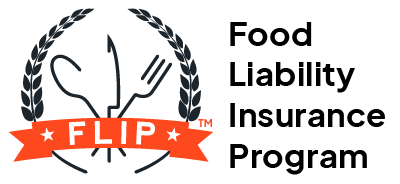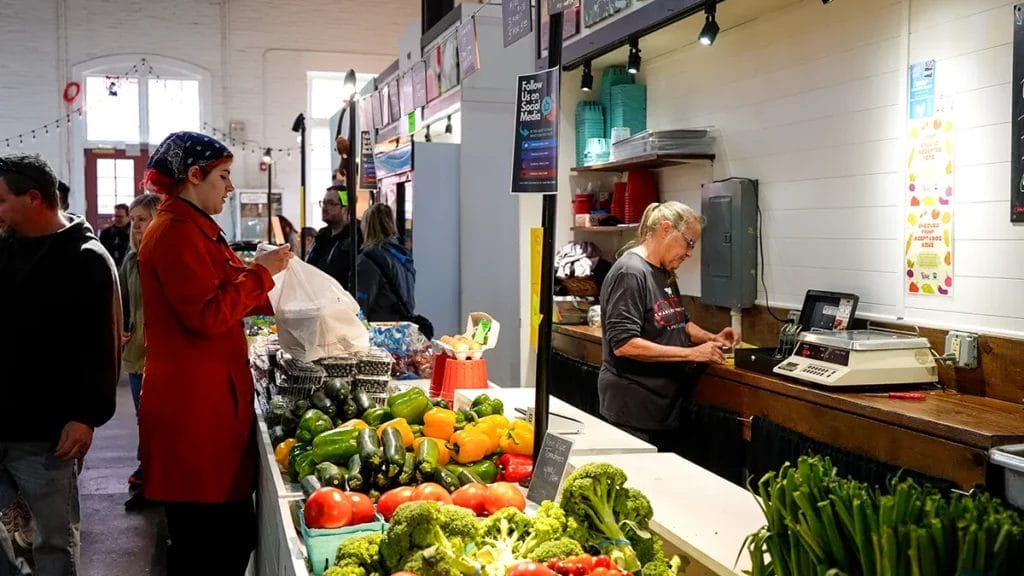To thrive in America’s oldest continuously operating farmers market, you need more than just a good product. So, when Food Liability Insurance Program (FLIP) visited Lancaster Central Market in Pennsylvania earlier this year, we spoke with several vendors there to learn more about their experience.
Many of them generously shared their top farmers market advice, which we’ve compiled for you here! Which of these six tips will you adopt into your strategy this year?
1. Offer Free Samples
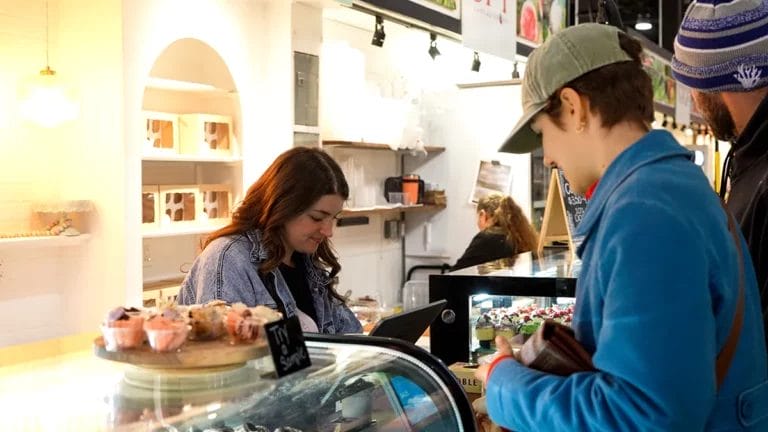
It’s hard to say no to something free, especially if that something is food — and the vendors we spoke with enthusiastically agreed. When we asked how they attract customers to their booths, many mentioned free samples.
“People love to walk by and grab a sample, and then you can reel them in because they don’t want to leave,” said Lauren, who runs the stand for her mother’s cupcake business, Moore Desserts by Julie.
Throughout the day, Lauren places cups filled with cupcake samples on top of the glass display case near the register. This strategic location allows her to connect with any passersby who stop for a taste, increasing her chances of making a sale.
Tips for Success:
- Offer samples of your most popular items because they’re most likely to appeal to a wide range of palates
- If you offer unusual flavors (e.g., avocado ice cream), provide a free sample of these items to take the hesitation away for customers who aren’t sure if they want to buy yet
- Keep your free samples replenished throughout the day by taking advantage of downtime between customers
- Display your samples clearly with a sign that says “free” to catch roving glances
2. Be Friendly and Engage
It may seem like a no-brainer, but when you’re busy managing your inventory and ringing up customers, it can be challenging to connect with each person.
However, remember that part of why people come to farmers markets is because they’re seeking community. They don’t want the experience to feel as impersonal as checking out at the grocery store — they want to know the faces and names of the people behind the food they buy.
“It’s all about the connection you make with the customer,” said Cathy of Breakaway Farms, a butchery in Mount Joy, PA.
Getting to know the people who stop by your stand is key to your success and keeps people coming back to buy from you week after week. It’s less expensive to retain existing customers than to attract new ones!
Tips for Success:
- Even when you don’t have a lot of time to chat, something as simple as greeting each customer with a smile and asking them about their day makes a huge difference
- If you learn customers’ names, do your best to remember them so you can give them a personal greeting each time they stop by
- Offer exceptional customer service that shows each person you genuinely care about them and their experience with your products
3. Cater to Different Dietary Needs
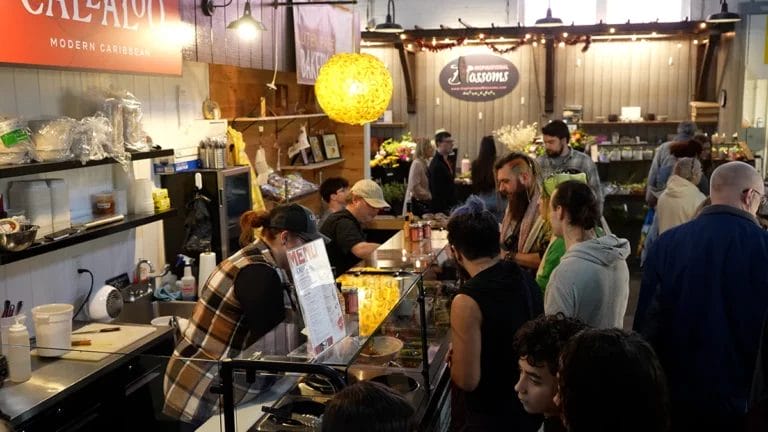
Vegan and plant-based menu items continue to rise in consumer demand, as does demand for food products safe from common allergens (gluten, nuts, etc.). You need to consider this as a vendor, no matter what type of food you sell.
Christopher, an employee at Callaloo Modern Caribbean, said this was his top advice for farmers market vendors wondering how to attract as many customers as possible.
“You’ve got to have something for everybody,” Christopher told us. “We have pork and seafood and so forth, but then we’ve got the vegetarian, vegan, and low-carb options. You don’t want to turn away any potential customers.”
Tips for Success:
- Create versions of your classic product that suit the most common dietary restrictions (e.g., vegetarian, vegan, gluten-free, paleo, low-carb, and nut-free)
- If you make food to order, offer substitution options customers can choose from to customize their dish (e.g., an option to swap out the beef in your signature bulgogi bowl for marinated tofu)
- Ask your customers what health-conscious options they would like to see on your menu via email surveys, Instagram polls, or comment cards they fill out at your booth
4. Network With Other Vendors
Many of the Lancaster Central Market vendors we spoke to acknowledged how difficult it can be to get a booth in a market with a lot of foot traffic. Competition can be fierce, especially when you’re trying for a spot in an iconic market like Lancaster’s.
“Dedication” and “persistence” were two words we heard often from Lancaster standholders when asked what it takes to become a farmers market vendor. For Sophia, an employee at Kauffman Orchards, the secret sauce to getting your foot in the door is networking.
“Talk to people who are in it, and they can hook you up. They can give you the connections and the information you need,” she told us. Sophia also mentioned that the other standholders she’d spoken with at Lancaster Central Market were always happy to share their knowledge and experience with other vendors.
Tips for Success:
- Visit the market you want to get into and buy from some of the vendors to start establishing a relationship with them
- After connecting with vendors, ask them how they got into the market and if they have any tips
- Speak with the market manager and ask about any potential openings (but make sure you check the market’s website and socials first in case they have more information posted there)
- Be patient and understand that demand for spots is high, but staying persistent yet professional will pay off
5. Create a Comprehensive Business Plan
You can have the most popular stand, but if you don’t have a concrete plan for your business, you risk short-lived success at the market. Nate from Lancaster Distilleries stressed this point while speaking with us.
“One of the great things about a farmers market business is that it requires less capital than purchasing a brick-and-mortar location,” Nate said. Despite an easier barrier to entry, he still acknowledged the importance of having a business plan. “You need to make sure your income exceeds your expenses.”
Business plans cover everything from your mission statement to your financial projections. In many cases, you will be asked to present your plan when you apply for business loans. Additionally, some farmers markets ask to see your plan when you apply for a spot (Lancaster Central Market is one of them!).
Tips for Success:
- Include a description of your business, the story behind it, and your mission statement
- Analyze your competitors and include this information in your plan to show how your business stands out from theirs
- Add information about all sources of funding you rely on to run your business, from personal finances to loans
- Include your pricing strategy and a menu of products you sell that contains the cost of each item
6. Bring Your Passion to Market
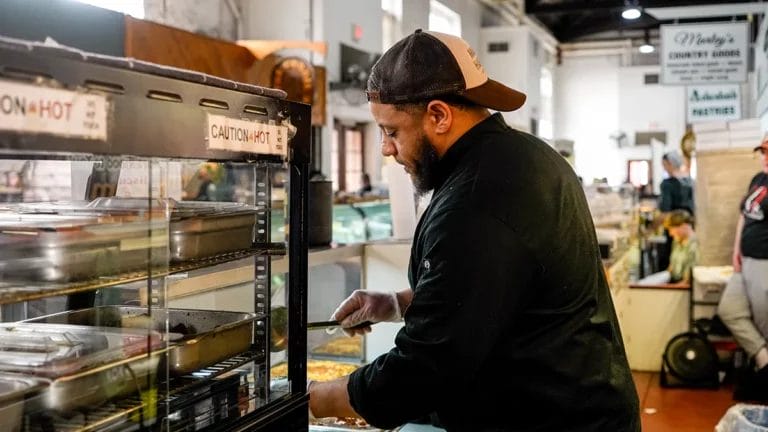
Across all our conversations with vendors at the market, one theme came up in nearly every conversation: passion.
“If you have a unique product and you really care about that, that’s going to show in a farmers market setting,” said Andrew, owner and operator of Linden Dale Farm.
Corey, owner of Soulcialize, echoed this sentiment. “Focus on what you’re doing. Be passionate about it.”
Unlike selling your products at a grocery store or distributing them to retail locations, participating in a farmers market allows you to sell your products firsthand. It’s the perfect opportunity to show your passion for your business and spread that enthusiasm to your customers.
Tips for Success:
- Display pictures of your kitchen, farm, or other workspace at your booth to give customers a behind-the-scenes look
- Tell your story with signage that briefly describes how and why you started your business, as well as your mission statement
- If you grow produce, hand out free recipe cards with tips on how to cook and serve different fruits and veggies
- When customers ask about your products, always talk about them with enthusiasm and take the chance to educate without being sales-y
Pro Tip: If an accident happens at the market because of your business, farmers market insurance can shield you from the cost of claims. Learn more about the cost of FLIP’s farmers market coverage and how it protects your passion.
FAQs About Farmers Market Tips and Tricks
How Do I Find and Join a Local Farmers Market?
- Search online for markets in your area or check your city/county website
- Visit local markets to get a feel for the foot traffic, what type of vendors are there, and whether your business would be a good fit
- Talk to the vendors about their experience
- Fill out an application (most markets post theirs online with information about when they accept new vendors, but you may need to speak with the market manager directly)
What Are Common Mistakes New Farmers Market Vendors Make?
- Poor presentation: An unorganized display or hard-to-read signage can cost you sales. Practice setting up your booth at home to get a feel for what looks good/what doesn’t, and learn farmers market display tips to help you attract customers.
- Lack of preparation: Showing up to the market prepared is key to setting yourself up for success. Keep a checklist of supplies you must bring and review each item before you leave for the market.
- Not engaging with customers enough: When you’re just starting out, you might feel shy or uncomfortable speaking with people who visit your booth. Remember, a lot of people shop at farmers markets so they can get to know the people growing and making their food, so striking up a conversation won’t be seen as weird or unwelcome.
What Time Should I Arrive at a Farmers Market to Set Up?
Always aim to arrive at least an hour before the market opens so you’re ready to start selling as soon as customers roll in. Some markets have designated setup windows, especially indoor markets where someone will need to unlock the building to let you in, so always check the market’s website or talk to the manager to see how early you can arrive.

Alex Hastings
Seattle-based copywriter and (WA) licensed insurance agent Alex Hastings leverages her experience as a lover of fast-casual food, baked goods, and iced oat milk lattes. She holds a B.A. in Creative Writing from Western Washington University. Before working at Veracity, she was a retail copywriter at Zulily and an English language teacher in South Korea. Alex is fully trained on FLIP insurance coverages and writes content that connects food and beverage business owners with the policies they need.
Seattle-based copywriter and (WA) licensed insurance agent Alex Hastings leverages her experience as a lover of fast-casual food, baked goods, and iced oat milk lattes. She holds a B.A. in Creative Writing from Western Washington University. Before working at Veracity, she was a retail copywriter at Zulily and an English language teacher in South Korea. Alex is fully trained on FLIP insurance coverages and writes content that connects food and beverage business owners with the policies they need.
